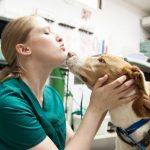All dog owners have to deal with canine health issues at some point!
In This Article You Will Read About
Whether it’s preventative care, minor puppy issues, contagious illnesses, accidents or injuries……
…. having a run-in with some type of dog health problem is pretty much unavoidable.
Of course there are things we can do to minimize potential problems, and veterinary care today is usually excellent.
Luckily, when caught early and treated properly, the vast majority of dog health issues can now be taken care of very effectively by trained professionals.
The biggest problems occur when we either don’t recognize the symptoms of dog illness or injury, or take a ‘wait and see’ attitude when veterinary help is needed.
The results of these errors can be pretty costly – and not just in terms of money.
Sometimes what started out as a simple problem, can turn into a BIG problem if left untreated. You definitely want to avoid that happening to your dog!
Common Dog Health Issues
Puppies and dogs have many of the same illnesses/conditions as we do. These include things like diabetes, hypoglycemia, canine congestive heart failure and other cardiac issues, kidney problems, arthritis, cancer, canine allergies and so on.
Other illnesses are specific to dogs in particular, or animals in general. This group contains dog illnesses such as Parvovirus, Distemper, Kennel Cough and Rabies.
Plus parasitic-born diseases such as Lyme Disease, Coccidiosis and Giardia, and canine worms of all types.
Finally, there are symptoms of dog illness that are common to both minor and major canine health issues. The most common of these are digestive problems such as diarrhea and vomiting, but also include fever, lethargy, weakness, loss of appetite, pain/discomfort, limping, straining, hair loss and many more.
Rottweiler Health Issues
All breeds have particular health problems that they are especially susceptible to, or that are hereditary in nature. Rottweilers are no exception!
As with most large and giant breed dogs, Rottweilers are prone to joint/bone issues such as canine hip dysplasia and elbow dysplasia and panosteitis. Another canine health issue that is most often seen in large breeds is bloat (or torsion), and Rotties are at risk of this due to their size and deep-chested structure.
In addition to the above, this breed seems to have more than it’s fair share of canine heart disease, cancer, kidney problems and canine allergies.
Last but definitely not least, is the fact that Rottweilers are one of the breeds in the ‘high-risk’ category when it comes to Canine Parvovirus.
This vicious disease has a high mortality rate in unvaccinated puppies of all breeds, but Rotties seem to succumb more easily than many others.
For this reason, it’s vitally important to keep your Rottweiler puppy up to date with his puppy vaccinations, and make sure to get annual boosters taken care of on time.
Disease Prevention In Dogs
Many of the diseases that kill puppies and dogs can be prevented by keeping up a regular schedule of vaccinations. The importance of this cannot be over-emphasised.
You can find out all about canine vaccinations, and see a suggested vaccinations schedule, on my Puppy Vaccinations page.
Other types of canine health issues involve parasites of all different types.
Dogs can be hosts to many different parasites including tape worms, round worms, hook worms, heart worms, fleas, ticks and protozoa (single cell organisms that cause diseases such as Giardia).
There are many excellent parasite prevention products that can kill/prevent parasitic infestations, however you should never buy over-the-counter medications for canine health issues.
Your veterinarian can recommend/prescribe/administer de-worming medications, flea/tick preventatives and diagnose and treat protozoa-borne dog illnesses.
OTC products are often ineffective at best, and can have both unwanted and dangerous side effects. There are also natural products available if you want to take a more holisitic approach.
A good, nutritious diet (click here for info. on how to choose the best puppy food for pups of all breeds), and the right amount of physical exercise and mental stimulation are also very important in keeping a dog healthy and happy.
When it comes to your dog’s health, it’s always better to be safe than sorry. If you have any worries or feel that your dog may not be 100%, it’s definitely worth having your vet take a look at him/her.
Early treatment and diagnosis are much more effective, and less costly, than letting things get out of hand. Plus that peace of mind is priceless!
How To Know When Something Isn’t Right!
It can definitely be tricky for new puppy/dog owners to know when they’re pet is ill or when to seek veterinary help.

There are some canine illness symptoms that can indicate both minor and major conditions.
Sometimes the severity and frequency of the symptoms can give you an idea of whether or not your dog needs help, but if you’re ever in doubt it’s always better to talk to, or visit, your vet.
If your pups symptoms are mild, or you’re concerned about a minor health issue, an online veterinarian is a very cost-effective alternative to a vet visit.
You can get an answer to your question within a few hours (often even faster), and for a small fee. Visit my Ask A Vet A Question page to find out more.
BUT if your pup is clearly feeling unwell, has the symptoms of one of the more serious dog diseases, is injured, or it is an emergency situation. This sort of circumstance required immediate veterinary attention ‘in the flesh’!
Any significant change in your dogs behavior can indicate canine health issues that need to be addressed. For example, if your dog is normally a ‘chow hound’ but suddenly seems totally disinterested in his food bowl, you could have a problem.
Similarly, a normally active dog who turns into a couch potato overnight could be feeling ill. More obvious signs of dog illnesses that are often seen include diarrhea and/or vomiting.
While loose stools can be caused by a sudden change in diet (including dietary ‘indiscretions’), stress, medications, dog food allergies and so on, it can also be one of the first signs of several serious dog diseases such as Parvo, Coccidiosis, Coronavirus etc.
One or two episodes of loose stools, without other symptoms, isn’t necessarily cause for panic.
But repeated dog diarrhea which gets progressively more severe or is accompanied by other symptoms, such as vomiting or lethargy , should be evaluated by your veterinarian IMMEDIATELY.
Potentially serious canine health issues such as Parvo could be to blame. In these cases time is not on your side and getting help fast is imperative.
For a comprehensive look at the symptoms of many canine illnesses, check out my Dog Diseases & Symptoms page.
If you haven’t found the answer or information you need on this page, or are interested in information on a specific topic, please use the searchbox below to find all the relevant articles/pages on my website.
Just type whatever word/phrase best describes your needs (ie. rottweiler personality or puppy biting) and hit ‘search’, you’ll instantly get access to all the info and advice you need…….

